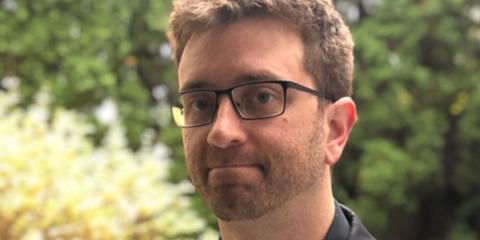Q&A with Randall Zigler

Randall Zigler joined the Conservatory in 2019 as a professor of double bass and contemporary classical music. His work spans orchestral and chamber music, contemporary music (including numerous world premieres), and education.
You’ve been performing new music with the International Contemporary Ensemble (ICE) for nearly 20 years. How has the contemporary classical music landscape changed in that time? What advice do you have for students looking to enter that sphere professionally?
One change I’ve observed is the blurring of borders between stylistic strains. When ICE was starting out, a lot of ensembles were staying in certain lanes. More recently, my sense is that groups and composers aren’t as interested in fitting into a particular scene, which results in a more diverse and interactive landscape. This applies to venue as well, as audiences are becoming more accustomed to sitting in concert halls and hearing what was once considered a less formal sort of music, or to hearing music traditionally performed in concert halls while standing and having a drink. These things aren’t new, but seemed like an adventurous novelty when my generation was starting out.
My advice for students looking to enter the contemporary classical music sphere is to try to build connections with other similarly curious musicians as early as possible, including while you’re in school. There isn’t really a standardized professional track, the way there might be for an orchestral musician, but that can be a positive feature of this kind of career path, because opportunities can arise organically out of genuine musical exploration and interaction.
Much of your work takes place in more traditional symphonic and chamber music environments, with groups like the Boston Ballet Orchestra and Emmanuel Music. How do you balance that work with your interest in contemporary music?
I always find it a bit strange how often we distinguish between traditional and contemporary playing, because both umbrellas contain a wide variety of styles and approaches to begin with. Ultimately, each work requires its own set of skills, regardless of time period.
The main challenge of a varied career is simply that I don’t cycle through the same repertoire as often. Obviously, contemporary works are often brand new when they reach me, but even with certain standard orchestral works, I find myself revisiting the repertoire a bit less frequently than more orchestrally oriented colleagues, and it can take a concerted effort to keep them in shape. Fortunately, I enjoy the process, and very rarely does any music feel stale.
Do you have a favorite work that you have premiered, or favorite experience working with a contemporary composer?
I have about 30 excellent answers for this question, but one recent standout is the monodrama Dolce la Morte, by Suzanne Farrin. The work is gorgeous, and the musicians had an uncommonly collaborative role in multiple stages of the process. We’ve given performances in several beautiful venues including the Metropolitan Museum of Art, and produced a recording that felt really successful (you can find it here). Suzanne became a great friend, and not just because she included a huge duo for double bass and countertenor!
You seem equally passionate about performing and teaching. What has been most gratifying about working with the Boston Youth Symphony Orchestra (BYSO) and its Intensive Community Program (ICP)?
One remarkable feature of my experience with ICP is the opportunity to form relationships with students from a young age and watch them grow, both as musicians and as individuals. I don’t know of many educational roles in a kid’s life that begin as young as five or six years old and continue potentially through high school, and that’s been really unique and meaningful. It’s all the more inspiring to see how much value music has for them as they become exposed through BYSO to major symphonic and operatic repertoire at a pre-professional level.
With that in mind, I’m a big believer in creating opportunity and access for as many families as possible in as many communities as possible. I think sometimes when we measure success in young musicians, we can lose sight of the idea that increased exposure is a success in and of itself, and likely the best way to cultivate talented artists organically over time.
What excites you most about joining the Conservatory faculty?
Overall, I would say I am excited for the opportunity to connect with students at a stage where they are still discovering possibilities, even as they also pursue mastery of specialized details. In a way, I feel like my own career has continued to involve some balance of those ideals, and the Conservatory’s mission seems in line with that path.
